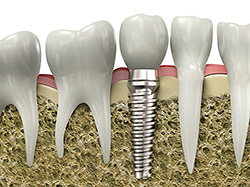Dental Implants Crowns

A dental implant is a synthetic tooth root made of titanium in the shape of a post that is surgically placed into the jawbone and serves as a replacement for a missing tooth.
It provides a foundation for attaching a dental prosthesis, such as a crown, bridge, or dentures.
The ideal candidate for dental implants is a non-smoker who has good oral health, including a sufficient amount of bone in the jaw and healthy gums with no signs of gum disease. A board-certified periodontist or an oral surgeon will determine if you are an eligible candidate.
Stages of a Dental Implant
- Surgical Implant Placement: This is the part that is completed at the periodontist or an oral surgeon.
- Osseointegration: This period can take three to six months for an implant to fuse with the surrounding bone. During this time, a temporary crown or denture can be used if necessary.
- Abutment Placement: The abutment is a connector piece that is placed on top of the implant post after it has integrated with the bone. It is a short, wide screw that extends above the gumline to support the artificial tooth.
- Crown Placement: This is the visible part of the implant, designed to look and function like a natural tooth. It can be made from various materials, including porcelain, zirconia, or a combination of materials, depending on aesthetic and functional requirements.
Benefits of Dental Implants
- Natural Look and Feel: Implants look and function like natural teeth.
- Durability: With proper care, implants can last many years, often a lifetime.
- Bone Preservation: Implants help maintain bone density and prevent bone loss that can occur with missing teeth.
- Improved Function: They restore normal chewing and speaking abilities.


